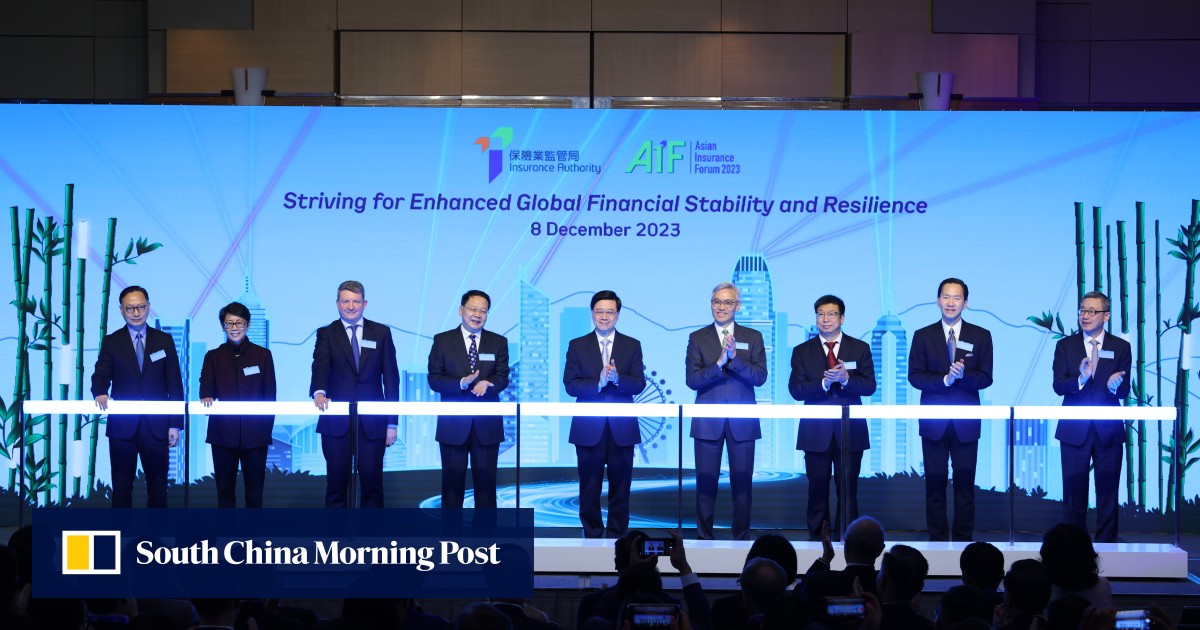[The content of this article has been produced by our advertising partner.]
The Asian Insurance Forum 2023, which took place on December 8 at the Hong Kong Convention and Exhibition Centre, witnessed a remarkable surge in attendance, surpassing the numbers seen ever since the inaugural edition in 2018.
With over 1,700 participants, both online and in-person, this year’s forum boasted an impressive number and proved to be a resounding success in terms of engagement and participation of Asia’s insurance industry.
The event also drew regulatory counterparts from Europe, America and Asia, including esteemed members of the Macroprudential Monitoring Working Group of the International Association of Insurance Supervisors (IAIS).
In his opening remarks, Mr Stephen Yiu, Chairman of the Insurance Authority (IA), drew upon the symbolism of bamboo, a plant known for its resilience and strength in Chinese culture, to describe the insurance sector. “The insurance industry shares many attributes of the bamboo like flexibility, resilience, strength, versatility and vitality, rendering it a reliable modulator that smooths out the undulations of an economic cycle and a powerful buffer that shields societies off the harm of natural or man-made perils,” he said. He also recounted the experience and lessons learnt from the pandemic and highlighted the need for joint efforts when navigating through the headwinds.
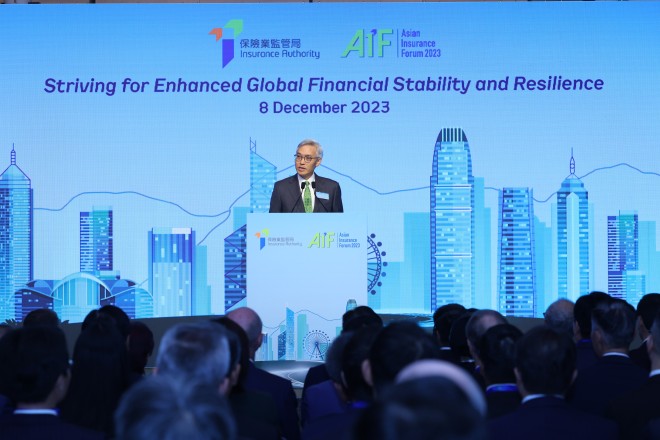
In his keynote speech, Mr John Lee, Hong Kong’s Chief Executive, recognised the importance of insurance amidst global financial fluctuations. “Our economies, our businesses and our communities need all the ‘insurance’ they can secure. All the insurance we can realise,” he said. “The insurance industry, in managing, mitigating and transferring risks, plays a pivotal role in enhancing financial stability and resilience.”
He outlined the significant progress made since the publication of the Development Roadmap for the Insurance Sector in Hong Kong last year, including measures to embrace the emerging market of the Guangdong-Hong Kong-Macao Greater Bay Area (GBA) such as the implementation of the Unilateral Recognition policy for cross-boundary motor insurance, the pursuit of the establishment of after-sales service centres in the GBA and the exploration for more cross-boundary products for GBA residents. “These measures will not only benefit people in the GBA but also help facilitate mutual access with the insurance market on the Mainland,” he said.
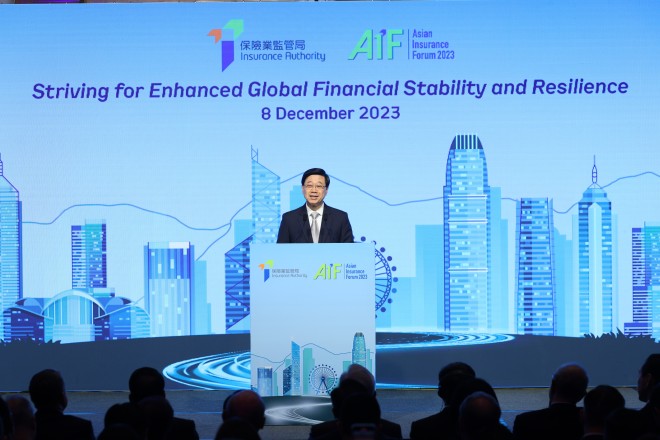
In his keynote speech, Mr Paul Chan, Hong Kong’s Financial Secretary, gave an overview of the latest developments of Hong Kong’s insurance industry and trends that are shaping its future specifically in key areas like innovation and technology, climate change, and the social value of insurance. “Beyond maintaining the stability and security of the financial system, it is through consistently developing and enhancing our financial markets that we could strengthen our resilience,” he said, echoing the theme of the event and encouraging the industry to leverage the opportunities ahead.
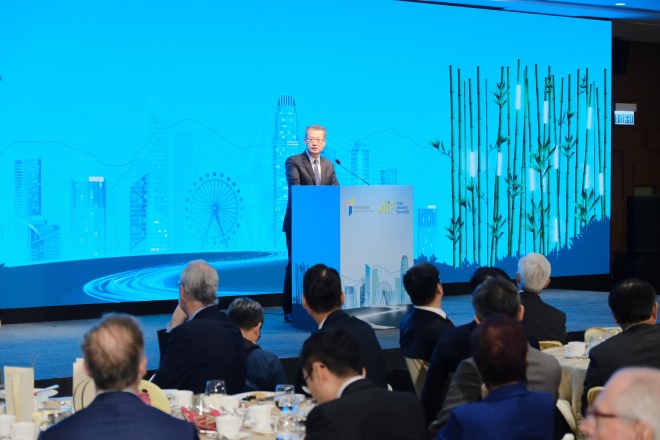
During his keynote speech, Mr Jonathan Dixon, Secretary General of the IAIS, discussed the growing importance of resilience in today’s global environment. He emphasised the need for the insurance industry to prioritise innovation and sustainability.
Hong Kong’s advantages as a risk management centre
The forum comprised four panel discussions. The first panel discussion was moderated by Mr Bernard Chan, Former Convenor of the Non-Official Members of Hong Kong’s Executive Council and Chairman of Asia Insurance Company Limited, featuring senior executives from industry heavyweights to discuss the advantages of Hong Kong as a risk management centre.
Speaking of using Hong Kong to offload risks, Mr Michael Bennett, Head, Derivatives & Structured Finance, Capital Markets, Treasury of the World Bank, saw potential from the city’s mature capital market for insurance-linked securities (ILS). He said the Government’s financial incentive would also motivate issuers to consider issuing ILS in Hong Kong. Mr Tony Gallagher, the Regional Chief Executive Officer, Asia Pacific of Guy Carpenter, believed Hong Kong can become a regional hub for insurance and reinsurance due to its strategic location and regulatory framework.
Ms Jessica Tan, Executive Director, Co-CEO and Executive Vice President of Ping An Group, praised Hong Kong’s proximity to the Mainland market as a huge advantage, while Mr Kevin Strain, President and Chief Executive Officer of Sun Life, described Hong Kong as a training ground for the financial industry, with all top banks and insurers located within walking distance and multi-cultural talents of diverse backgrounds.
Global financial markets: opportunities and risks
In a panel discussion led by Dr Au King-lun, Executive Director of Financial Services Development Council, Mr James McCormack, Global Head of Sovereign and Supranational Ratings of Fitch Ratings, discussed the top risks facing the financial market. According to an audience poll, geopolitical risk emerged as the most significant concern. Other noteworthy challenges included global economic slowdown, inflation and disinflation, and uncertainty regarding changes in interest rates.
The panelists highlighted various approaches to address risks at different levels. Ms Jayne Plunkett, Group Chief Risk Officer of AIA Group, emphasised the company’s focus on diversification by expanding into new markets as a primary driver for their continued growth. Mr Matthew Michelini, Partner, Head of Asia-Pacific of Apollo Global Management, highlighted private credit as a new alternative asset class for insurers and pension funds, while Mr Romain Paserot, Deputy Secretary General and Head of Capital and Solvency of the IAIS, observed a significant change in the asset allocation strategy of life insurers, with an increase in their exposure to private equity. With this latest trend, Mr Paserot highlighted the need for supervisors to work together in establishing a unified framework for governing insurers’ offshore investments. This would help mitigate potential risks and ensure effective supervision of their activities.
How ESG/DEI generates business value
This panel discussion was co-organised with the Hong Kong Academy of Finance and moderated by Prof Christine Loh, Chief Development Strategist of Institute for the Environment of the Hong Kong University of Science and Technology (HKUST).
The panel featured experts from reputable institutions including Ms Farnam Bidgoli, Global Head of ESG Solutions of HSBC; Ms Chitra Hepburn, Head of APAC ESG and Climate, Head of South & Southeast Asia of MSCI; Prof Paul Yip, Chair Professor (Population Health), Department of Social Work and Social Administration of the University of Hong Kong; and Mr Gabriel Wilson-Otto, Head of Sustainable Investing Strategy of Fidelity International, sharing their expertise in ESG solutions, climate impact, population health, and sustainable investment strategy.
While panelists acknowledged the impact of ageing crisis on productivity and economic growth, Prof Yip highlighted the positive contributions the elderly can make with proper support and policies in place. Mr Wilson-Otto added that the growing need for increased healthcare services calls for dynamic optimisation of insurance products to effectively respond to the changing demands.
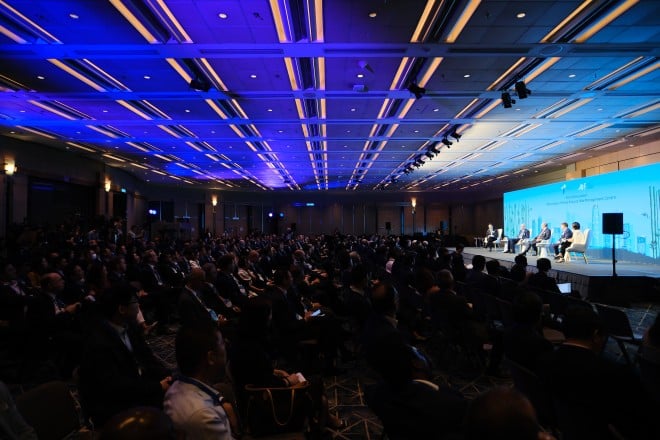
Harnessing the synergies between insurance and Web3
Dr Norman Chan, Former Chief Executive of the Hong Kong Monetary Authority and Founding Chairman of the Hong Kong Institute of Web3.0, served as the moderator for this panel discussion. Mr Yat Siu, Co-Founder and Executive Chairman of Animoca Brands, described Web3 as a new paradigm that revolves around the concept of ownership. It builds upon the principles of Web2, which focused on social media and contribution, and Web1, which prioritised information sharing and transparency. In Web3, ownership takes centre stage, empowering individuals in innovative ways and generating substantial value.
Prof Hui Kai-lung, Senior Associate Dean, School of Business and Management of HKUST mentioned that Web3 can bring about disintermediation and innovative solutions, unlocking new capabilities to address evolving needs. Mr Keith Choy, Interim Head, Intermediaries and Chair of Fintech Advisory Group of the Securities and Futures Commission, shared insights on the importance of virtual assets within the Web3 world while Mr Peter Yan, Chief Executive Officer of Hong Kong Cyberport Management Company Limited, underscored Cyberport’s role in fostering startups in the fintech and insurtech sectors within the Web3 ecosystem.

